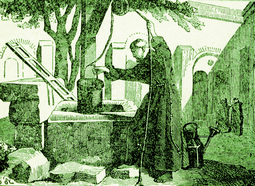Lives of the Saints
Our Models and Protectors
Spiritual Bouquet:
May 13

Saint John the Silent
Bishop, Monk of Saint Sabas
(454-558)
Saint John was born of a noble Christian family of Nicopolis in Armenia, in the year 454, inheriting from the virtue of his parents a more illustrious nobility than that of their station. After their death, the young man built at Nicopolis a church in honor of the Blessed Virgin, as well as a monastery, which he himself entered when only eighteen years of age, with ten fervent companions, all desiring to make the salvation and perfect sanctification of their souls their unique and earnest pursuit.
Not only to shun the danger of sinning by the tongue, but also out of sincere humility and contempt for himself and love for interior recollection and prayer, Saint John very seldom spoke. When he was obliged to do so, it was always in very few words, and with discretion. He was greatly afflicted when, at the age of only twenty-eight, he was obliged by the Archbishop of Sebaste to quit his retreat in 482, for the Archbishop desired to ordain him bishop of Colonian in Armenia.
In this new dignity Saint John always preserved the same spirit, and, insofar as was compatible with the duties of his charge, continued his monastic austerities and exercises. But finding himself persecuted in his diocese and fearing to bring down on it still greater troubles, he resolved to leave and go to Jerusalem, to live there unknown. While he was watching one night in prayer, however, he saw before him a bright cross formed in the air, and heard a voice which said to him, If you desire to be saved, follow this light. It seemed to move before him and finally point to the monastery of Saint Sabas, not far away, which at that time contained one hundred and fifty fervent monks. Saint John was then thirty-eight years old.
After living there unknown for some years, fetching water, carrying stones, and doing other menial work, Saint Sabas, judging his monk worthy to be promoted to the priesthood, presented him to the Patriarch Elias of Jerusalem. Saint John took the patriarch aside, and, having obtained from him a promise of secrecy, said, Father, I am already a priest and have also been consecrated bishop; but on account of the multitude of my sins I have fled, and have come to this desert to await the visit of the Lord. The patriarch was startled, but promised not to reveal the matter. God, however, through the ministry of an Angel, revealed to Saint Sabas also while he was at prayer, that his monk was a bishop. Then Saint John, finding himself discovered, wished to leave the monastery; Saint Sabas prevailed on him to remain, by a promise never to divulge the secret.
In the year 503, Saint John withdrew into a neighboring wilderness, but in 510 returned to the monastery, where he confined himself for another forty years to his cell. By his example and counsels, he guided many fervent souls to God and continued to emulate, as much as this mortal state would allow, the glorious employment of the heavenly spirits in their uninterrupted exercise of love and praise. He passed to their blessed company soon after the year 558, having lived seventy-six years in the desert, interrupted only by the nine years of his episcopal dignity.
Reflection. A love of Christian silence is proof that a soul makes it a delight to be occupied on God, and finds no consolation comparable to that of conversing with Him. This is the paradise of all devout souls.
Little Pictorial Lives of the Saints, a compilation based on Butler's Lives of the Saints and other sources by John Gilmary Shea (Benziger Brothers: New York, 1894); Les Petits Bollandistes: Vies des Saints, by Msgr. Paul Guérin (Bloud et Barral: Paris, 1882), Vol. 5